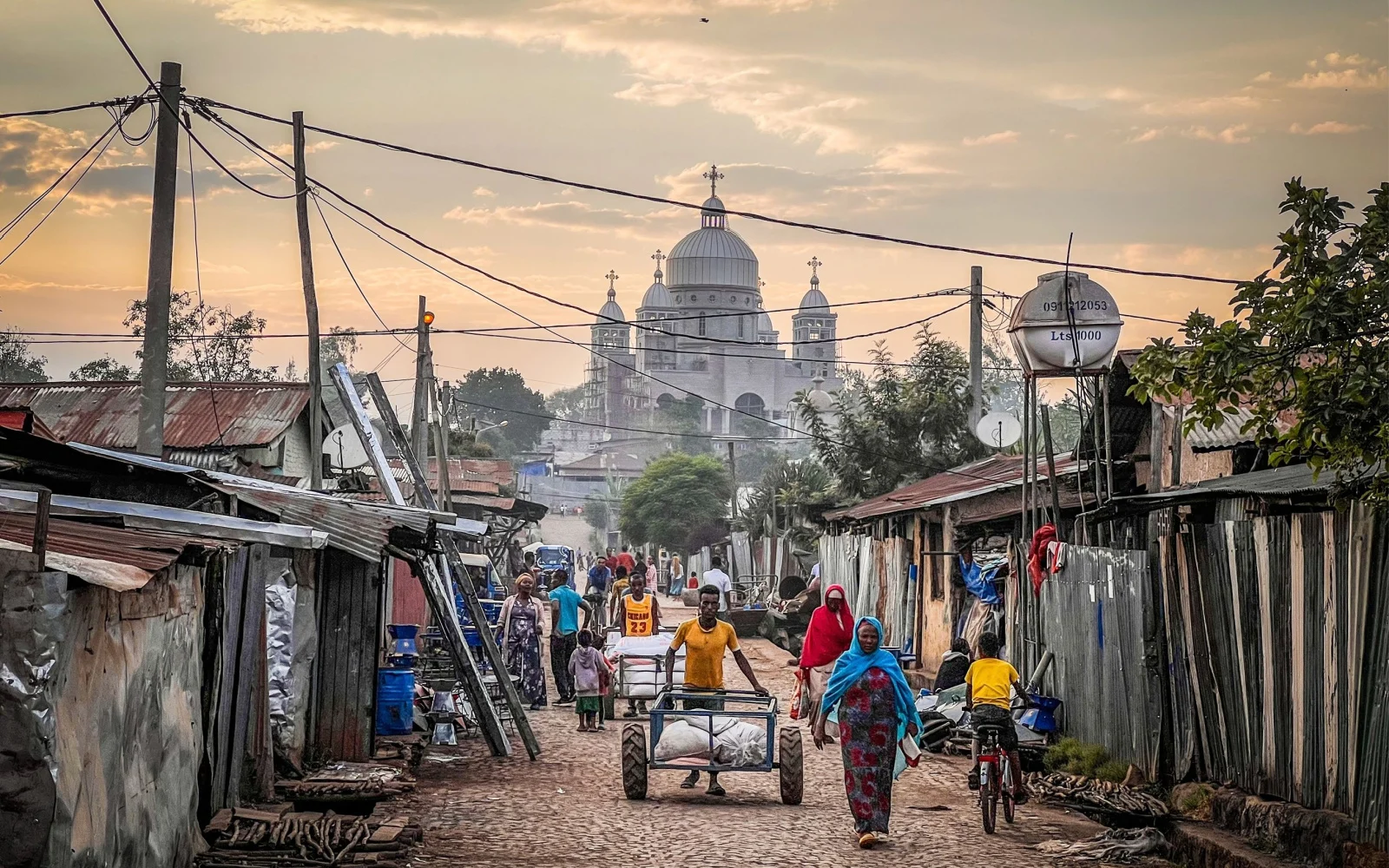Is Ethiopia safe to visit?
No. Ethiopia is not safe for travel due to widespread unrest, armed conflicts, and risks like high crime and kidnapping. Governments, including Australia and the US, recommend reconsidering travel there, particularly highlighting dangers in border areas near Somalia and the conflicted Tigray region.
Despite a ceasefire in Tigray, instability persists, exacerbated by porous borders and internal ethnic clashes, making even non-border areas risky.
Ethiopia, in Eastern Africa, has one of the oldest civilizations in the world and is a must-visit destination for lovers of history and nature. Ethiopia is home to the oldest history in the world—some scientists think humanity originated in the Great Rift Valley.
For more recent history, visit the rock-hewn caves of Lalibela or the soaring castles of Gondar. For natural beauty, head to the Blue Nile waterfall or countless barely discovered natural wonders in the country’s diverse regions.
While it boasts a long and proud history, its more recent past has been tumultuous, and many people have concerns about visiting. So, is Ethiopia safe to visit? We’ll show you below.
Is Ethiopia Safe to Visit?
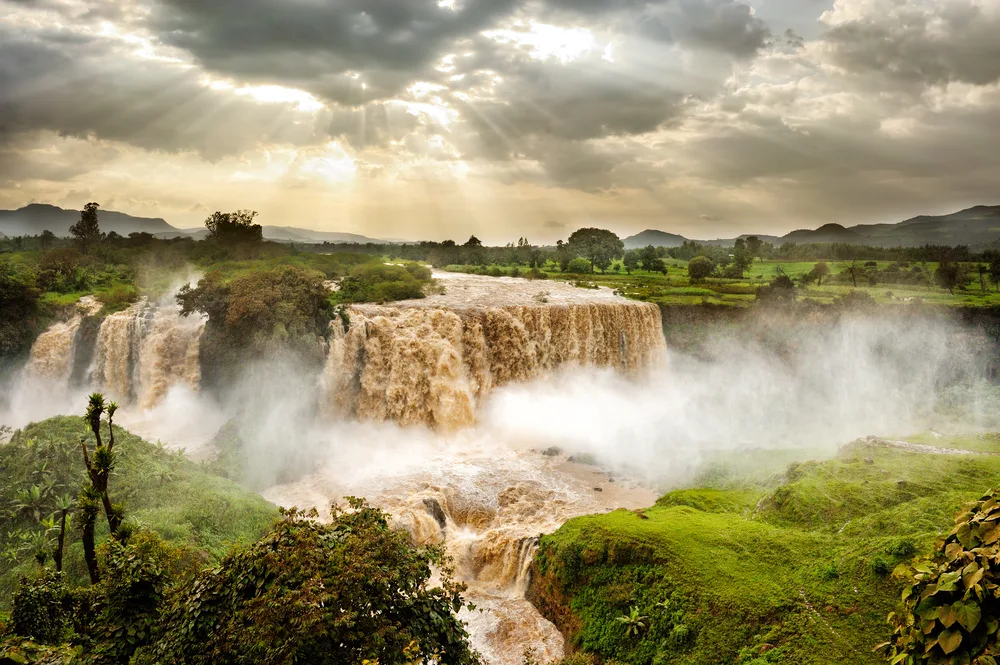
Aleksandra Kossowska/Shutterstock
No. Ethiopia is not safe to visit right now due to high levels of unrest and even armed conflict in some regions. Most governments advise that their citizens reconsider travel to Ethiopia unless they have a compelling reason to do so.
Australia advises its citizens to reconsider travel, which is the Level 3 out of 4 travel advisory that they issue. This warning level is echoed by the United States.
The main reasons you are at risk in Ethiopia include:
- High crime rates
- Kidnapping
- Civil unrest
- Armed conflict
- Terrorism
- Communication disruptions and government crackdowns
Some regions of Ethiopia are more dangerous than others. The country is fairly big and conflict in one part doesn’t necessarily mean another part will also be affected. The border region near Somalia is the place with the highest risk of terrorism and kidnapping.
The practically failed state of Somalia is just over the porous border, and Al-Shabaab militants often make attacks in Ethiopia as well. Tensions between the two countries have also been rising recently over Ethiopia’s port deal with the unrecognized breakaway state Somaliland, so experts fear an armed conflict.
Another region of Ethiopia suffering from geopolitical conflict is Tigray. For two years, there was a bloody armed conflict in this region, which borders Eritrea, between the Ethiopian army, Eritrean army, and a local separatist group, the TPLF.
Although they signed a ceasefire in November 2022, sporadic violence still breaks out and the infrastructure is still very damaged. In general, Ethiopia’s border regions are not very safe. Unrest from nearby Sudan, South Sudan, and Kenya, which have conflicts of their own, tends to spill over.
The country doesn’t have that many resources to enforce border control, so the loose borders attract crime and smugglers. Even if you are outside of the border regions, that doesn’t mean that you are safe from conflict.
Armed militia groups, often motivated by ethnic rivalries, often clash with the government. In August 2023, there were fears of a new civil war in Amhara state, and many other states have long-simmering ethnic conflicts.
When you’re in Ethiopia, always make sure that you are following the news as unrest could break out any time. Authorities often crack down hard on protests or expressions of unrest, even turning off Internet and phone service, so be prepared for anything.
Crime in Ethiopia
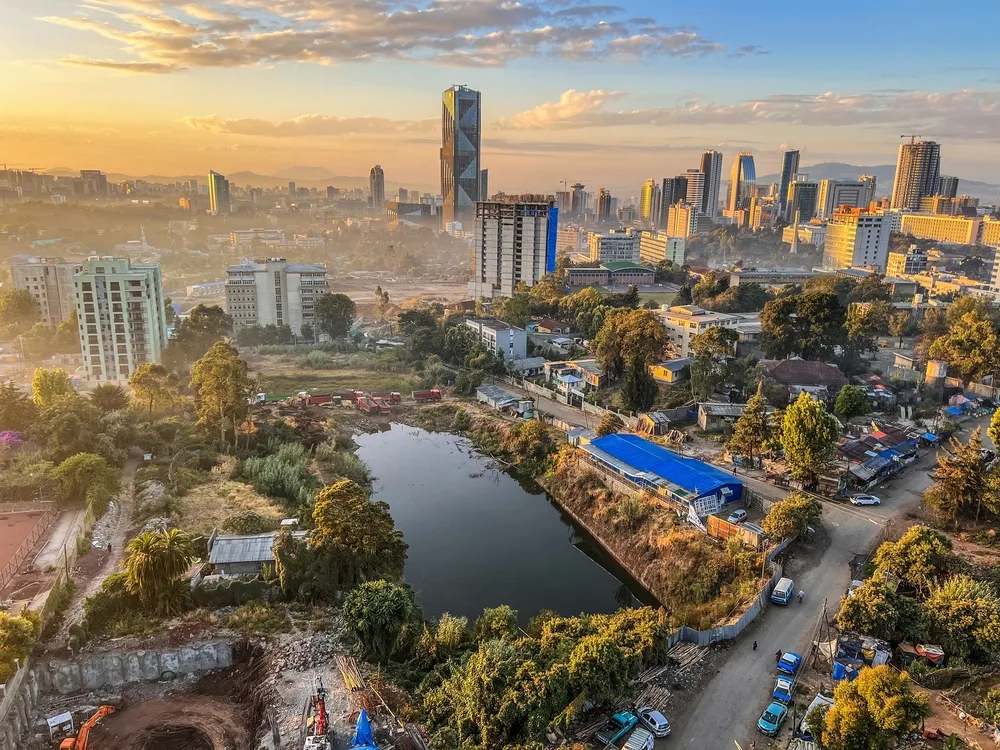
Eric Isselee/Shutterstock
In addition to its problems with geopolitics and civil unrest, Ethiopia also suffers from a fairly high crime rate, including crimes that affect tourists. Of particular concern is the moderately high violent crime rate.
According to World Bank data, Ethiopia has an intentional homicide rate of 8.63 incidents per 100,000 people as of 2012. This is higher than the global average.
Many people feel unsafe in Ethiopia. According to survey responses for the capital, Addis Ababa, respondents feel that it has a moderate level of street crime, lower than some other African cities.
However, certain crimes such as theft from vehicles and bribery are omnipresent, and many residents feel as if crime has gotten worse over the past few years. According to the Organized Crime Index, Ethiopia has serious struggles with problems such as human trafficking, arms trafficking, illegal poaching, cannabis smuggling, and fraud.
Although these crimes are not likely to affect the average tourist, they contribute to overall criminality. The trouble with getting an accurate picture of crime in Ethiopia is that accurate crime statistics are hard to come by.
The government doesn’t have full control over its entire territory, and many crime statistics haven’t been updated in a decade. Still, from word of mouth and other sources, it’s clear that Ethiopia is also struggling with crime.
Theft
Theft is a problem in Ethiopia, like in many other countries, and is the most common crime that affects visitors. Addis Ababa, Ethiopia’s capital, is the part of the country that is the safest from unrest but is at the highest risk of theft and other petty crime.
According to a travel advisory from the Canadian government, pickpockets and bag snatchers tend to operate around popular tourist attractions such as:
- Merkato
- Entoto
- Meskel Square
Another common form of petty theft is break-ins, targeting vehicles and residences alike. This is widespread throughout Ethiopia, both in Addis Ababa where tourists are more frequent, and in more rural areas where criminals know law enforcement is far away.
To prevent this crime, make sure that you secure your accommodation and always lock and bar windows and doors.
Kidnapping
In some parts of Ethiopia, there is a risk of kidnapping and being held for ransom. According to the Australian government, there is a risk of kidnapping in areas where there is a high risk of armed conflict and terrorism, especially near the Somali border.
Kidnapping groups tend to target high-profile Westerners such as aid workers with the goal of exchanging for ransom or sending a political message.
The most important thing you can do is to avoid high-risk regions, even if you are someone that enjoys adrenaline-filled travel. Most Western governments have policies against negotiating with terrorists and you may find yourself in quite a sticky situation.
In general, try not to attract too much attention to yourself by bragging about your wealth, using ATMs on the street, or wandering around alone. Even if you don’t get kidnapped, this behavior could make you the victim of a robbery.
Avoiding Bad Areas
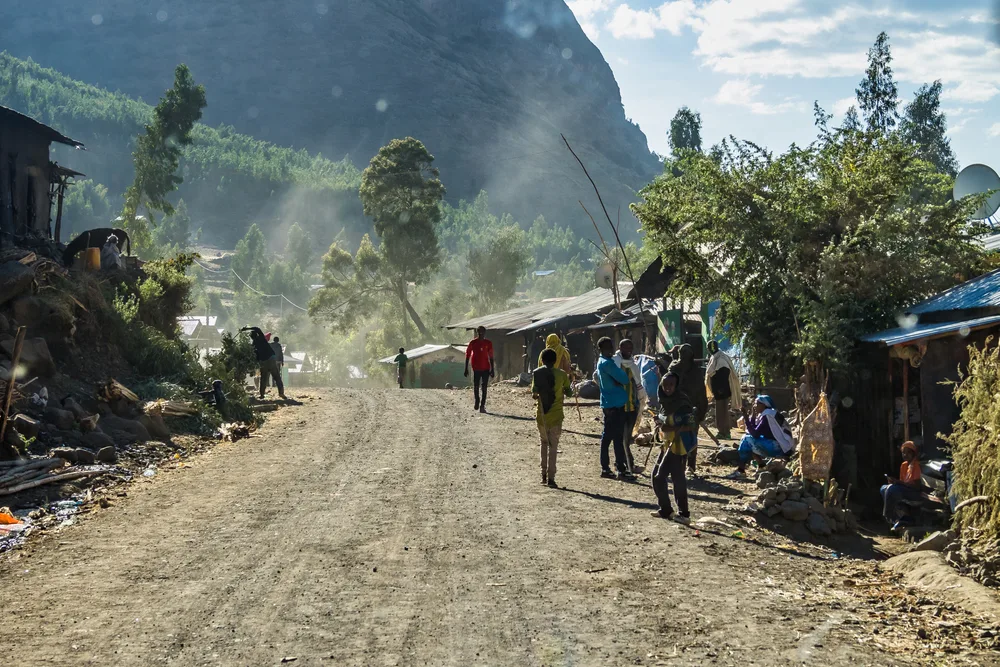
RudiErnst/Shutterstock
Many regions of Ethiopia are engulfed in unrest, so make sure that you avoid the worst parts of the country. Places to avoid include:
- Border regions (with Somalia, South Sudan, Sudan, and Kenya)
- Tigray state
- Amhara state
- Parts of Afar region
- Oromia
This is not a comprehensive list, so check the situation on the ground before planning your trip. The political situation in the country is volatile and could change at any time, so be prepared.
Things to Consider
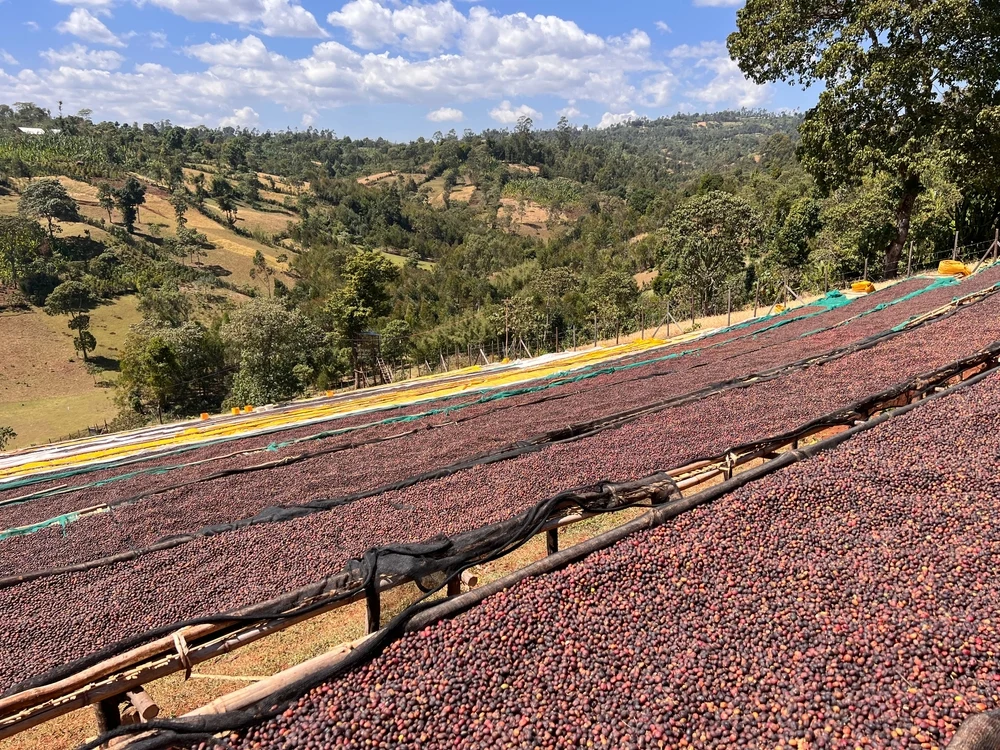
Eric Lsselee/Shutterstock
Here are a few additional tips to help you stay safe in Ethiopia:
- There is a risk of terrorism in Somali State. Al-Shabaab sometimes carries out attacks on the Ethiopian side of the border. Be careful of large gatherings.
- Avoid getting on the wrong side of the government. Don’t do anything that might be seen as a provocation, such as taking photos of secure buildings, or break even minor laws, such as drug possession. Foreigners have been detained in the past.
- Take precautions against disease. Infectious diseases such as malaria and parasites such as bilharzia are common throughout Ethiopia. You may need to get additional vaccines, such as yellow fever vaccines.
Frequently Asked Questions
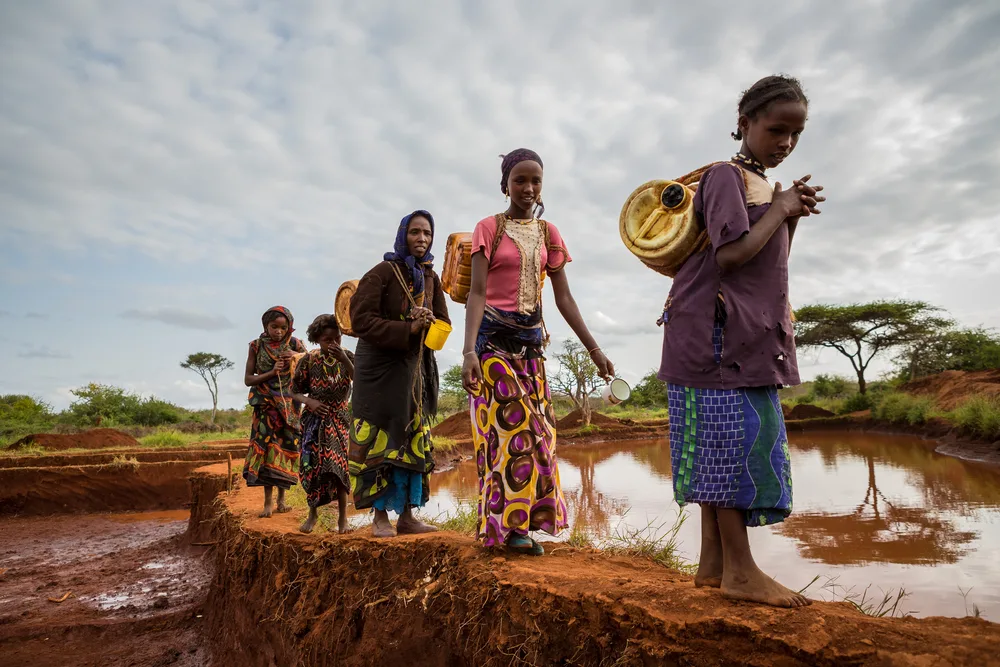
GAYO VILLAGE, ETHIOPIA – JUNE 19: Women and young village girls collect water from a rain water pool which is purified before use with tablets. on June 19, 2012 in Gayo village, Ethiopia/Martchan/Shutterstock
These additional questions will provide extra help when planning your trip:
Is Ethiopia tourist-friendly?
Ethiopia is not very tourist-friendly because it isn’t very safe, and it doesn’t have as much tourist infrastructure as other countries, but travelers that make the trip are rewarded with amazing sights.
Why do tourists go to Ethiopia?
Despite the hardships, many tourists go to Ethiopia. They want to see amazing natural landscapes and historical landmarks that are unlike anywhere else in the world.
Is now a good time to travel to Ethiopia?
Now is not the best time to visit Ethiopia because most regions outside of Addis Ababa and a few other central states are engulfed in unrest, but the political situation may calm down soon.
Is it safe to eat in Ethiopia?
It is safe to eat in Ethiopia as long as you are mindful of food safety. Eat at places that are reasonably full of locals and that prepare food fresh in front of you. Be especially careful with the water and only drink bottled water.
Is it safe to walk in Addis Ababa?
During the day, it is safe to walk in Addis Ababa as long as you are aware of traffic. At night, it isn’t safe because the rate of violent crime increases.
So, Is Ethiopia Safe to Visit?
Ethiopia is not safe to visit right now due to various armed conflicts and civil unrest in different regions throughout the country. You can avoid the worst of this by sticking to Addis Ababa and a few other safe areas, but there you are still at risk of more mundane problems such as crime. A trip to Ethiopia should probably be postponed for a safer time.



